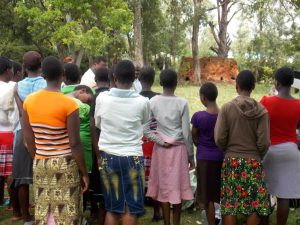
Some of the rescued girls who escaped FGM at Komotobo Center in Kuria East sub-county
By MN Reporter
Child activists in Kuria region in Migori County have decried the rising cases of early pregnancies and child marriage in the region and their adverse impact girls’ education.
The activists say that scores of girls in the region are dropping out of school due to pregnancies and others are married off while still in school.
Ms Natalie Robi Tingo, the founder of Msichana Empowerment Centre, an Non governmental organization fighting Female Genital Mutilation in Kuria said a huge number of girls in the region are not in school.
“It is unfortunate that many girls in Kuria are dropping out of school due to pregnancies and early marriages. The numbers of affected girls keep increasing,” said Ms Robi.
The activist attributed the rise in these vices to the FGM which is prevalent in the region despite efforts to fight it. She says traditionally, when girls undergo the outlawed rite, they are taken to be adults and therefore sexually mature.
Sex pests prey on these girls as they believe they have been made ready for marriage.
“When young girls undergo FGM, they are seen as mature and ready for marriage. Sex pests then prowl on them leading to pregnancies and others are married off while still in school. This explains girl child education is still low in the entire Kuria region,” added Ms Robi.
Some education stakeholders in Kuria East have cited FGM and its attendant effects for the low enrolment of girls in schools in the region. Girls schools are the most affected as they continue to receive few students.
The three main girls schools in Kuria East, Kwibancha Girls, Sakuri Girls and Nyaroha are said to have low population of students compared to other schools because of the plight of the girl child in the region.
“FGM, early pregnancies and marriages have conspired to keep many Kurian girls from school. This is the reason why pure girl schools are struggling to get students. Those schools that have huge populations are mixed with boys being many,” said one of the principals in Kuria East who requested anonymity.
The Kuria community still cling on the rise despite it being illegalised.
The government of Kenya 2011 banned the rite following the passage of “Prohibition of Female Genital Mutilation Act 2011” into law.
Despite efforts by the government and non governmental organizations to end the vice, it is still pervasive in various communities.
In Kuria, scores of residents still value the rite and have severally vowed not to stop it. In the region, education of girls is still largely secondary to the vice.
The community is planning to carry out the rite this year in large numbers after it was skipped in the year 2017 on grounds that number seven brings bad omen.
Activists have blamed government officials–mostly chiefs and assistant chiefs–for their laxity in combating the vice.
“The vice can be fought and be contained only if government officials became serious. The problem is chiefs and assistant chiefs do not care reporting the perpetrators of the vice to the police,” said pastor Francis Marwa, a renown anti FGM campaigner in Kuria East.
Mr Marwa added: “The police officers in the region on the other hand look the other way as the vice is carried out. In 2016, it happened in broad daylight and police watched from a distance.”
Security officers working in the region have been reported to be among the sex pests preying on school girls.
At Makararangwe and Getongoroma in Kuria East, residents blame the General Service Officers stationed at the two areas for sexually molesting school girls.
Speaking during a consultative meeting organized by anti FGM activists held at Makararangwe last week, residents said many girls are sexually taken advantage of by the officers hence leading to increased cases of pregnancies and early marriages.
“These officers have taken advantage of our girls. They lure them with money and end up impragnanting them. Some have even married young girls from schools,” said Mr John Chacha, a resident of Makararangwe in in Ntimaru sub County.

